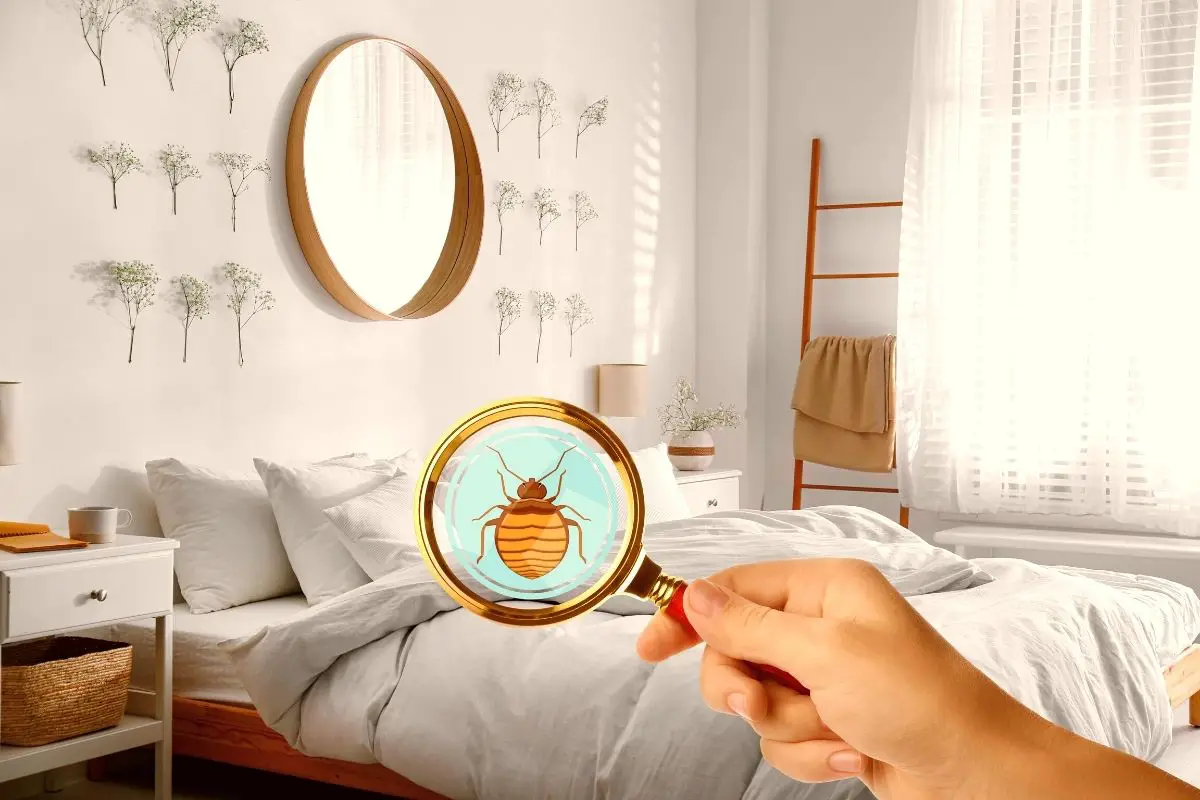How to use lavender oil for bed bugs treatment?

Bed bugs are notorious pests known for their resilience and ability to infest homes unnoticed. Despite their small size, they can cause significant discomfort and inconvenience to those unfortunate enough to encounter them. Did you know that bed bugs can survive for several months without feeding?
Exploring the Lavender Oil Solution
Many people seek effective and safe methods to rid their homes of bed bugs, and one such solution gaining attention is lavender oil. Lavender oil, derived from the lavender plant, is renowned for its calming scent and various therapeutic properties. However, its potential as a bed bug treatment is still being explored.
In this blog, we aim to delve into the effectiveness and application of lavender oil as a natural remedy for bed bugs. We'll discuss how lavender oil works, its benefits, and how to use it effectively to combat these persistent pests.
Understanding Bed Bugs

Bed bugs are small insects that feed on the blood of humans and animals. They are nocturnal creatures that hide in various places during the day and come out to feed at night. Understanding their life cycle, hiding spots, and signs of infestation is crucial for effective pest control.
Biology of Bed Bugs
Bed bugs have a distinct anatomy, with six legs, a flat oval body, and a reddish-brown color. Despite their small size, they can be easily seen by the naked eye. These pests feed by piercing the skin of their hosts and extracting blood. Their feeding habits often result in itchy welts on the skin.
Life Cycle of Bed Bugs
The life cycle of bed bugs consists of several stages: egg, nymph, and adult. Eggs are laid in secluded places and hatch into nymphs, which resemble smaller versions of adult bed bugs. Nymphs require blood meals to molt and develop into adults. Under favorable conditions, bed bugs can reproduce rapidly, making infestations challenging to control.
Where Bed Bugs Hide
Bed bugs are adept at finding hiding spots close to their hosts. Common hiding spots include:
- Mattresses and box springs: Bed bugs often hide in seams, crevices, and folds of mattresses and box springs.
- Furniture: They may hide in cracks and joints of furniture, such as sofas, chairs, and nightstands.
- Baseboards and wall hangings: Bed bugs can hide behind loose wallpaper, electrical outlets, and baseboards.
- Luggage and clothing: When traveling, bed bugs can hitch a ride in luggage and clothing, infesting new locations.
Signs of a Bed Bug Infestation
Detecting a bed bug infestation early is essential for effective control. Common signs include:
- Bed bug bites: These bites often appear as small, red welts in clusters or lines on the skin. They may cause itching and discomfort.
- Shed skin: As bed bugs grow, they shed their exoskeletons, leaving behind molted skins in hiding spots.
- Fecal matter: Bed bugs leave behind dark, rusty-colored fecal stains on bedding, mattresses, and other surfaces.
By being aware of these signs and understanding the behavior of bed bugs, individuals can take proactive steps to prevent and manage infestations effectively. Regular inspection and prompt action are key to keeping these pests at bay.
Using Lavender Oil for Bed Bug Management

Important Considerations Before Use:
Before using lavender oil for bed bug management, it's crucial to consider a few important factors:
Severity of Infestation: Keep in mind that while lavender oil can be effective for controlling bed bugs, it may not be suitable for severe infestations. It's best used as a supplementary method alongside other pest control strategies.
Safety Precautions: Safety should always be a priority when using essential oils. Lavender oil should be diluted properly before use to avoid skin irritation or adverse reactions. Always follow recommended dilution guidelines and avoid direct skin contact with undiluted oil.
Creating a Lavender Oil Spray:
To make a lavender oil spray for bed bug management, you'll need:
Ingredients:
- Lavender essential oil
- Water
- Spray bottle
Dilution Ratio:
- A safe dilution ratio for the lavender oil spray is essential. Aim for around 10 drops of lavender oil per cup of water. This ensures effectiveness while minimizing the risk of skin irritation.
How to use lavender oil for bed bugs? Application Methods:
There are several effective application methods for using lavender oil to combat bed bugs:
Spraying:
- When spraying, target areas where bed bugs are likely to hide, such as mattress seams, cracks in furniture, and baseboards. Ensure thorough coverage for optimal results.
Cotton Balls:
- Another method is to soak cotton balls in lavender oil and strategically place them in areas frequented by bed bugs. For example, you can tuck them under furniture legs or near potential entry points.
By following these steps and considering these important factors, you can effectively use lavender oil for bed bugs management strategy while ensuring safety and efficacy. Remember to regularly monitor the infestation and adjust your approach as needed.
Lavender Oil and Bed Bugs: Separating Fact from Fiction
In the battle against bed bugs, lavender oil has emerged as a potential solution. But what's the truth behind its effectiveness? Let's delve into the facts and debunk the myths.
Potential Benefits of Lavender Oil for Bed Bugs:
1. Repellent Properties:
Lavender oil's scent is believed to act as a natural repellent against bed bugs. These tiny pests are known to detest the aroma of lavender, which can help keep them at bay. Studies suggest that the strong fragrance disrupts their ability to detect human hosts, thereby reducing the likelihood of bites.
2. Calming Effect:
Beyond its insect-repelling qualities, lavender oil is renowned for its calming effects. By inhaling its aroma or using it in aromatherapy, individuals may experience relaxation and improved sleep quality. This can be particularly beneficial for those dealing with the stress and discomfort of bed bug bites, promoting better rest and recovery.
Limitations of Lavender Oil:
1. Lack of Strong Scientific Evidence:
Despite its popularity as a natural remedy, there's a scarcity of robust scientific research supporting lavender oil's efficacy as a direct insecticide against bed bugs. While anecdotal evidence and small-scale studies exist, more comprehensive research is needed to validate its effectiveness in repelling or killing these pests.
2. Ineffective for Killing Existing Infestations:
While lavender oil may deter bed bugs from infesting an area, it's unlikely to eradicate an existing infestation on its own. The oil's repellent properties may prevent further spread, but it's insufficient for eliminating a well-established colony. In such cases, professional intervention and integrated pest management strategies are essential for effective control.
In conclusion, while lavender oil shows promise as a natural repellent against bed bugs and may offer additional benefits such as relaxation, its effectiveness in combating infestations remains limited by the lack of conclusive scientific evidence. As with any pest control method, it's crucial to approach the issue with a combination of strategies tailored to the specific circumstances.
Alternative and Complementary Strategies for Bed Bug Control
Bed bugs can be a persistent nuisance in homes and hotels, but there are effective ways to manage and prevent infestations. Employing a combination of methods, including alternative and complementary strategies, can greatly enhance your efforts in controlling these pesky insects.
Importance of a Multi-Faceted Approach
To tackle bed bugs effectively, it's essential to adopt a multi-faceted approach. While lavender oil is beneficial, it works best when combined with other proven methods. This holistic approach ensures comprehensive bed bug control and improves the likelihood of success.
Physical Methods for Bed Bugs Control
Physical methods involve directly targeting bed bugs and their hiding spots to eradicate them from your environment.
1. Vacuuming Regularly
Regular vacuuming is a fundamental step in bed bug control. It's crucial to vacuum carpets, furniture, and mattresses frequently to remove bed bugs, eggs, and larvae. Vacuuming not only eliminates existing pests but also disrupts their breeding and feeding cycles, helping to reduce their population over time.
2. Steam Cleaning
Steam cleaning is an effective method for killing bed bugs at all life stages. The high temperatures produced by steam cleaners penetrate upholstery, mattresses, and other surfaces, effectively exterminating bed bugs and their eggs. This chemical-free approach is particularly useful for eliminating bed bugs in hard-to-reach areas where traditional pesticides may not be effective.
Preventative Measures for Bed Bugs
Preventative measures are essential for minimizing the risk of bed bug infestations and protecting your home from future outbreaks.
1. Mattress Encasements
Using mattress encasements is a proactive step in bed bug prevention. These specially designed covers encase mattresses and box springs, creating a barrier that traps bed bugs inside and prevents them from infesting your bed. Mattress encasements also make it easier to detect and eliminate bed bugs should they find their way into your home.
2. Travel Awareness
When traveling, it's important to be vigilant and aware of the risk of encountering bed bugs in hotels and other accommodations. Before unpacking, inspect luggage and hotel rooms for signs of bed bugs, such as dark spots on bedding or mattress seams. Taking these precautions can help prevent bed bugs from hitchhiking back home with you.
By incorporating alternative and complementary strategies into your bed bug control efforts, you can effectively manage infestations and reduce the likelihood of future outbreaks. Implementing a comprehensive approach that combines physical methods with preventative measures is key to achieving long-term success in controlling bed bugs.
Conclusion
While lavender oil offers a pleasant scent and potential calming benefits after dealing with bed bug bites, its effectiveness as a direct insecticide against these resilient pests remains unproven by strong scientific research. It's unlikely to eradicate an existing infestation on its own.
However, incorporating a diluted lavender oil spray alongside other strategies can create a more comprehensive approach. Remember, the key is to address bed bugs from multiple angles. Combining frequent vacuuming, steam cleaning for targeted areas, and encasing mattresses with physical barriers can significantly hinder their spread.
Frequently Asked Questions (FAQ'S)
Q. Is lavender oil effective in killing bed bugs?
There's limited scientific evidence to confirm lavender oil directly kills bed bugs. While it may repel them with its scent, it's unlikely to eradicate an existing infestation.
Q. Is lavender oil safe to use around the house?
Lavender oil is generally safe when diluted properly. However, it can irritate skin, so avoid direct contact. Always perform a patch test on a small area of skin before applying it more widely.
Q. 4. What are some alternative strategies for controlling bed bugs?
Vacuuming carpets and furniture regularly, using a steam cleaner on infested areas, and encasing mattresses are effective methods to combat bed bugs alongside other measures.
Q. When should I call a professional pest control company?
If you suspect a large bed bug infestation or your DIY efforts, including lavender oil, seem ineffective, seeking help from a professional exterminator is the best course of action.
Q. How to use lavender oil for bed bugs to repel?
Mix 10-15 drops of lavender oil with water in a spray bottle. Shake well and spray around bed frames, mattresses, and other infested areas. Repeat daily for best results.
Q. Is lavender oil effective against bed bugs?
Lavender oil contains compounds that repel bed bugs. While it may not eliminate an infestation entirely, it can help deter them and reduce their presence.
Q. Can I apply lavender oil directly to my skin to repel bed bugs?
No, it's not recommended to apply undiluted lavender oil directly to your skin. Always dilute it with water or a carrier oil to avoid irritation.
Q. How often should I apply lavender oil for bed bug control?
Apply lavender oil spray daily until the bed bug infestation subsides. Consistency is key to maintaining its repellent effect.
Q. Can I use lavender oil alone to get rid of bed bugs?
Lavender oil may help repel bed bugs, but it's usually not sufficient on its own to eliminate an infestation. Combine it with other control methods for best results.
Q. Are there any precautions to consider when using lavender oil for bed bugs?
Avoid applying lavender oil directly to bedding or clothing. Keep it out of reach of children and pets. If irritation occurs, discontinue use immediately.
